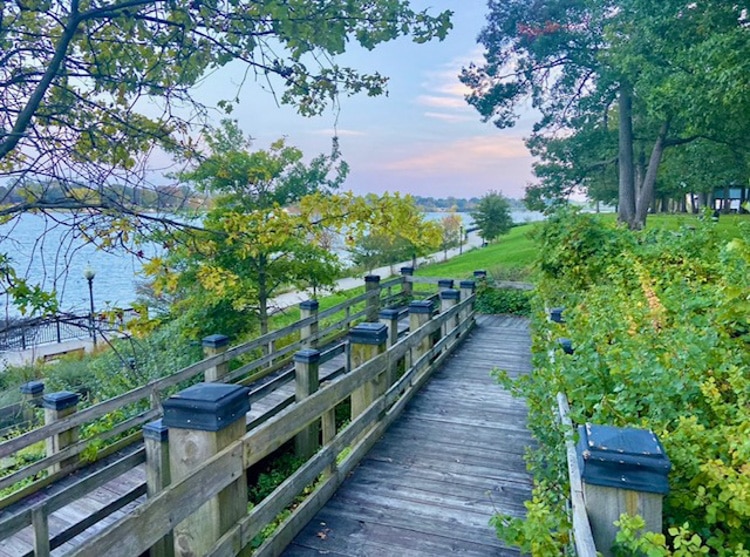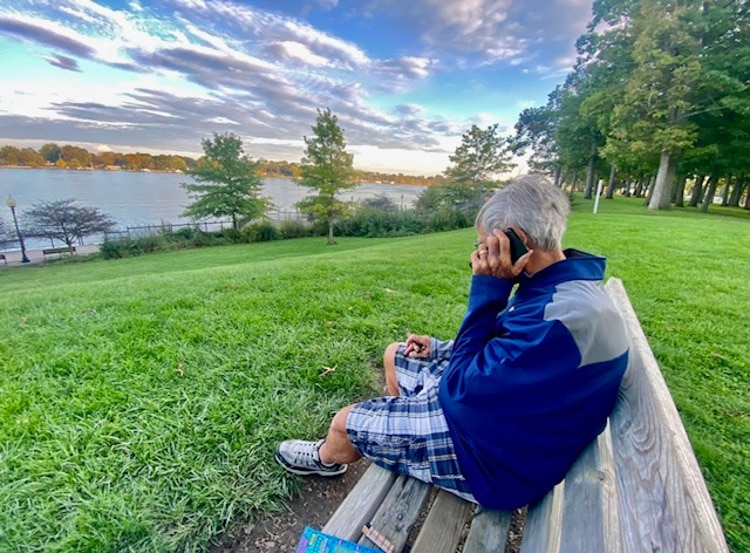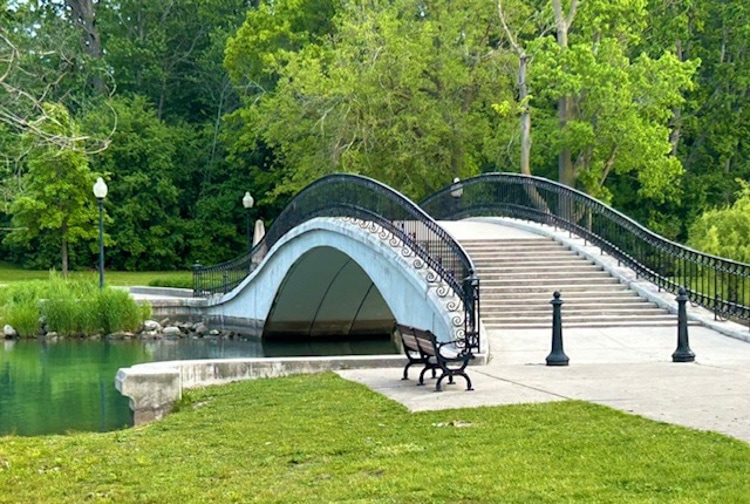
I have, in a series of columns, let my mind and keyboard wander across some of the destinations in which I’ve experienced some situational sweetness.
The “Downriver” area of suburban Detroit, Michigan, has always been known for its industrial prowess – steel mills, factories and freighters. All in support of Motor City’s auto industry. But there are pockets of peaceful nature, some preserved by industrial donations, amidst what some call the “Rust Belt.”
One of those sanctuaries is Elizabeth Park, a 103-year-old riverfront respite adjacent to downtown Trenton, Michigan. It sits just across from Grosse Ile, an upscale enclave island that divides the Detroit River from Ontario, Canada before it reaches Lake Erie.
Elizabeth Park feels like a narrow island itself since it is reached, by car or on foot, over small, scenic bridges. There is no cost to drive in or park along the one-way, 1.5-mile loop road that encircles Elizabeth Parks’ wooded interior. The Detroit River can be seen from the road since that portion of the park is elevated. So, even some of the parking spaces provide a panoramic view.

For those who leave their cars, there are barbeque grills, picnic tables, swing sets, slides, pony rides and baseball diamonds. There are even exercise-stretching devices dotted throughout the park. But there is no retail, other than a fanciful chateau, buttressed by flowers on the bluff above the river that serves as a wedding and event venue.
The equally fanciful footbridges that connect the island are so gorgeous they are often used as backdrops for wedding, graduation and prom photos. You’re likely to see everything from Middle Eastern people smoking shisha to catered picnics.
Downtown Trenton presents events such as the annual art fair; fireworks; Jazz on the River and power boat races along the river which are viewable from Elizabeth Park.
A Boardwalk Empire for Fishing
I walk the park’s waterside boardwalk area frequently where, morning and evening, I observe people casting lines over the side fishing. Some come with equipment and tackle boxes, some are more casually recreational about it.
Many of the people fishing come in factions of families: including fathers and daughters. The level of involvement in the actual angling seems to depend on the age of the child or grandchild. Whether they are actively casting or not really paying attention, the kids seem happy to be there.

As golf great Jack Nicklaus once said, “You know your child is ready for serious golf when he can go more than three holes without trying to catch a frog.”
If I may digress, for a moment, the Nicklaus comment reminds me of an anecdote with my son Harrison Shiels. He was probably eight years old when we were on a golf trip to Crystal Mountain Resort near Traverse City, Michigan.
We were staying in one of the resort’s golf-side condos. Ours was a multi-story, four-bedroom unit built into the hill among the trees along the left side of the 18th hole.
One morning I noticed the condo door wide open. I walked through the door and looking into the main level bedroom near the door, I saw Harrison. He was in his little striped golf shirt and khaki shorts, with a Scooby Doo bucket hat on, lying face down on the bed, with his head over the side looking at a blueberry muffin on the floor. A little, brown, plastic trash bin from the bathroom was upside down next to the muffin.
I stood for a moment or two surveying the surprising scene and wondering why he was motionless while intently staring at the muffin. My curiosity then got the best of me.
“Interesting,” I said as not to startle Harrison. “What are you up to?”
“I’m trying to catch a chipmunk,” he whispered.
This explained why the condo door was wide open – and the slider door leading to the deck, too, for that matter.
I am not sure what Harrison would have done if he’d covered a live chipmunk with that trash can, but I admired his willingness to bite off more than he could chew.
Take Me Fishing
While I walked along Elizabeth Park’s riverfront promenade, a tiny version of Havana, Cuba’s oceanfront Malecon, watching the culturally diverse groups of families fishing, I remembered both Harrison and then my own late father, Arthur Shiels, who loved fishing.
In their later years, after he’d spent decades fishing off his pontoon boat in Northern Michigan’s Sage Lake, he and my mother Gladys lived in Trenton Towers, along the river and adjacent to Elizabeth Park.
Before they bought the cottage in Sage Lake – which we named “Arthur’s Way” – my parents would take my brother and sister and me, along with extended family, to a rented cottage. It was situated among the mom-and-pop “resorts” on Houghton Lake, Michigan’s largest inland lake.
Cottage rental came with a row boat, and my grandfather would borrow the local pastor’s outboard Evinrude boat motor for some horsepower. My father would go out early fishing – and sometimes in the evening – with his father-in-law and my uncles.
I pestered him to take me and so, one morning, he relented. He piled my little brother Robert, and even our baby sister Lori into the boat at dawn.
The four of us motored out under gray skies in damp, cold air. It was perfect weather for fishing, but not so great when you are a soft third grader like me. I was chilly, so I tucked my hands inside the sleeves of my windbreaker jacket and clutch the fishing rod and reel through the gathered-up ends of my jacket sleeves.
At this point, you can probably imagine what I soon saw with my own eyes. The fishing pole I’d been provided by my father (of course I didn’t bait my own hook, that would have meant touching a worm) – had slipped from my vinyl grasp. It was sinking, tip down, into the green water on its way to “Davy Jones Locker” at the bottom of Houghton Lake (the sinkers on the line outweighed the bobber.)
It is at moments like that one desperately imagines they can make themselves, or the situation, “invisible.” I stayed quiet and wondered if anyone, especially my father, would ever notice? My brother and sister, in their own frigid misery, either didn’t notice the mishap or chose not to rat me out.
Who knows? Maybe there was a fish on the hook at the other end of that line. This is what I tried to tell my dad when, of course, he asked where my fishing pole was.

Elizabeth Park Forever
My father and I were not fishing at Elizabeth Park four decades later. Rather, we were sitting on a blufftop bench watching others with their tackle boxes casting lines into the river.
Just about 20 yards to our left, overlooking the river, was a young man who had created a romantic scene to the delight of a woman who’d just joined him. They sat on a large blanket amidst a catered dinner surrounded by candles and flowers with gentle music playing quietly and softly.
It was a beautiful scenario in the twilight.
But the sweet scene took place in the twilight of my father’s life. He’d just been diagnosed with Cancer – a Cancer he was told might spare two more years of his life.
“It is a good idea to get your affairs in order,” the oncologist at the University of Michigan Hospital told him.
My father and I sat on the bench talking about this and that while he puffed a cigar – and why the hell not?
“Don’t tell your mother.”
“I won’t.”
We faced east and the sky, there at the western edge of the eastern time zone, was a combination of purple, pink and orange.
“I have had a good life,” he blurted out. (It always seemed somehow easier for him to be philosophical with a cigar in his hand looking at water. The only thing missing was a Jameson Irish Whiskey he often sipped with the stogie.)
I was happy to hear him say this. It was a gift. And then he continued.
“Yeah, I had three good kids and you all turned out alright. I never really had any trouble with any of you.”
The statement revealed his true priority.
I knew this was a generous exaggeration, also, because most of any trouble he had with his children was with me.

My Mother’s Pony Predicament
My mother did get the worst of me once, at only pre-school age. And it had to do with Elizabeth Park. My pre-school, or nursery school as it was known then, scheduled a field day at the end of the school year.
The picnic day of partying, pony rides, sack races, ice cream and balloon tosses was scheduled to take place in Elizabeth Park. Whether the school heavily promoted the event or not, probably no other student anticipated the day more than me. I could barely sleep the night before.
The sandman must have sent me some winks, though, because I awakened to the sound of a spring rainstorm lashing my bedroom window. The next sound I heard was the absence of my mother’s voice. Typically, at that early hour, she would have been urging me to get up, brush my teeth, wash my face and get dressed.
This time, the dawn silence was deafening.
But there would be plenty of noise – from me – when she eventually told me the rain had washed away my wishes – no field day. This was a development I vociferously refused to accept for hours. It was a development I did not understand. Why not go forward with it?
It was also the morning an inconsolable little boy, who would grow up to be a writer, learned the distinction between the definitions of “postpone” and “cancel.”

Howdy, Stranger
One morning, as a fully-grown adult, I was walking along the river from my mother’s apartment in the Trenton Towers building to the Elizabeth Park boardwalk.
It’s about one mile each way through the leafy neighborhood, over one of the park’s fanciful bridges and down to the end of the boardwalk where a fence separates the park from the marina along the Grosse Ile Bridge.
The sun was out on a Sunday morning as I slipped through the sidewalks’ occasional shade. I was about to pass an apartment building on my left when I would see a woman emerging from her car which she’d parked along the curb on the street.
The woman was walking from the car on an angle toward the apartment building, on a course that would intersect and pass by me as I continued along the sidewalk. There was plenty of room for both of us as at mid-morning we were the only two on the street.
Without altering my steps my navigation proved accurate. The woman passed me without a word or look. I passed her, without a peep.
Passing so closely without even acknowledging each other was a split-second decision on both our parts.
My excuse? As a man, I felt I should defer to her and follow her lead and anticipate her body language so as not to seem intimidating to her alone on a street – even in the flash of passing. I felt immediate remorse, though. I should have at least nodded.
The fact that she chose to pass me without any acknowledgment was not terribly surprising. It stopped short of being disappointing – more like something I shrug off.
Never breaking stride, I continued south along the street.
And then…
I heard a woman’s voice well behind me break the Sunday silence.
“I’m sorry,” she said, in a plaintive tone.
I turned to look back without stopping my slow stroll.
“Good morning,” she then offered, as she made her way toward the apartment driveway.
“Hey, thanks,” I replied. “Good morning to you in this sunshine! That was sweet of you.”
Looking Back…
Just as I felt a tinge of awkward regret for ghosting past another human being, so, apparently, did the woman. She may have been very busy, but had the dignity to correct her mistake of omission before I did. For this, I salute her. I imagine her inner dialogue was similar to mine:
“Oh, I should have said ‘hello.’ That wasn’t right. I feel badly. Oh, I can still correct it. But now it’s awkward. Should I do it anyway? I have to – I won’t feel right unless I do. I mean, I could just go on with my day and eventually, I will forget about it. But I am not that kind of person. Oh, here goes!”
Then “I’m sorry,” spilled out.
Hopefully, my body language in response sent her the message: “I know, I know. I felt the same way and I should have said ‘hello,’ too.”
The late Catholic priest Father Jake Foglio, a New Yorker who spent much of his life at Michigan State University, preached, gently, that one should never walk past another person without offering some kind of acknowledgment. “You don’t have to be animated when you say ‘hi,’ but you at least have to nod or give a little wave,” he insisted.
He also felt a simple smile was powerful.
The woman walking near Elizabeth Park reinforced a few life lessons for me that morning:
- Never pass another person without at least a nod or smile, if not a wave or the word “hello.”
- It is never too late to correct a mistake of manners or politeness – even if it feels awkward.
- The other person might be feeling just as uncertain as you about greeting you. Go first!
Read more of Michael Patrick’s work at The Travel Tattler and contact him at [email protected]
